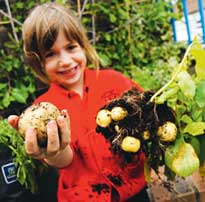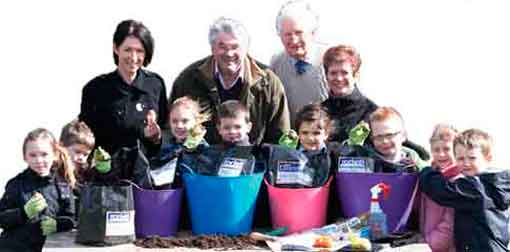Potato project tells kids where food comes from

Knowing the origins of food, how it is grown and how it makes its way into the supermarkets and homes has never been more important, not just to tackle increasing concerns about children’s diets but also to secure long-term demand for home-grown produce.
Farmers and educators have been taking action to get young people more interested in agriculture.
Growers and marketers agree that, through experience and learning at a young age, messages are likely to stay with children as they grow and can influence their diet and purchasing habits in the future.
There are more immediate paybacks, however, as lessons learned can often feed straight through to the family shopping basket.
One of the largest projects to make its way into the classroom is the Potato Council’s Grow Your Own Potatoes.
This activity illustrates how potatoes come to life and their role in a healthy, balanced diet. At its core is a fun, hands-on learning process, which gets children excited about potatoes and helps instil healthy attitudes at an early age.
The project has about 450,000 pupils taking part, the equivalent of nearly half of all primary school pupils. The first stage of the project – planting the seed potatoes – is under way and for the next three months pupils will be caring for and watching their plants grow.
The period from now until harvesting in June is when the industry can play an influential role and have the most impact; “buddying” up with schools, providing advice and practical help, and hosting farm visits. And taking an active role in educating children now should pay dividends by encouraging them to eat more potatoes in the longer term, particularly as they become exposed to a wider range of foods.
“The contribution made by the farming community is crucial to the project’s success,” says Graham Nichols, who farms at Tetbury in Gloucestershire.
Graham, a Potato Council board member, has been involved in Grow Your Own Potatoes for some time, helping schools plant and harvest their crops and, most recently, assisting 150 pupils from nine schools across West Berkshire get the project going in conjunction with the Newbury and District Agricultural Society.
Graham continues: “There are many positives to come from this simple yet effective scheme. First, we’re educating children about potatoes; getting them excited about the crop and hopefully at the end of it all, encouraging them to want to eat potatoes more often.
“Children are enthusiastic learners and from experience; they will go home and tell their parents, grandparents, aunts and uncles about projects at school, so we know that the messages can be passed on to a wider audience.
“Finally, the personal rewards from taking part in the project are great. To see the children who are initially unaware of how potatoes are grown to be full of knowledge and enthusiasm just a short time later is a really fulfilling experience.”
Robin Cropper runs a farm at Ormskirk, Lancashire, and helps pupils at nearby schools kick start their potato projects.
He says: “Many children in today’s society have lost touch with where their food comes from, so it is important we re-connect with them and help them discover this, which can feed straight back into family life and will pay dividends for the industry both in the short and longer term.
“The welcome we get from children and teachers is fantastic and they are really excited about the project. It’s fun, engaging and manages to get across many important messages in a very simple way.
“The implications if we do nothing are clearly evident, so it really needs the entire industry to do their bit in helping to change the way potatoes are perceived by the younger generation.”
This investment into educating tomorrow’s shoppers isn’t restricted to growers. Packers, processors and high profile influencers such as Peter Seabrook, gardening editor of The Sun newspaper, have been heavily involved in supporting Grow Your Own Potatoes and bringing agriculture and young children together.
But of course, as many of those supporting the project have found, the highlight for many schools is a visit from a “real-life” farmer.
As summed up by Graham Nichols: “It is our livelihoods and, with very real concerns about the future of the potato industry, it is in everyone’s interest to step up and into the classroom.”
Grow Your Own Potatoes
More details and promotional materials are available by calling 024 7647 8774 or emailing slawton@potato.org.uk.
School resources
The Potato Council project is linked within the UK curriculum, with worksheets and lesson plans available at www.potatoesforschools.org.uk, all aimed at building understanding and developing healthy habits in children.


